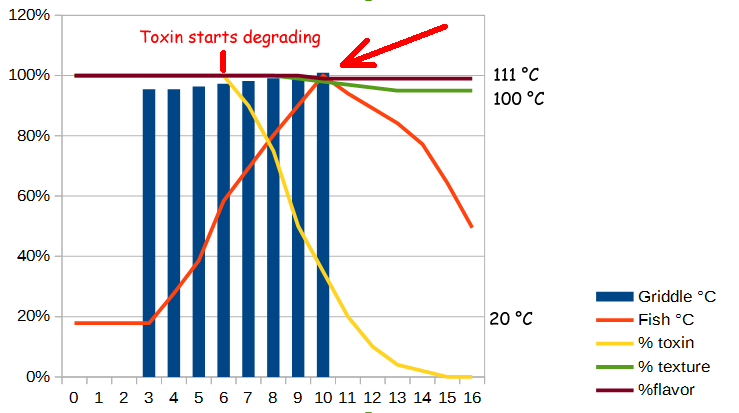Okay, modification of the fugu theme. You still have a poisonous fish, and it's expensive to boot. The difference is that the toxin is thermolabile - it denaturates above a certain temperature.
Unfortunately, this also happens to most flavour molecules in the fish, which are based on a very similar chemical make-up.
So cooking is a close run between the necessity of denaturating all of the poison, and yet preserving everything else. Of course, having a precise thermostat on an electric grill would make this very simple: so, assume we have neither.

To cook the fish to perfection, you need to cut it in the thinnest possible slices (to prevent one side being at too different a temperature from the other), marinate for exactly the right time in acidic juice - tolerance of about 30 seconds there - and instantly, or as fast as you can, transfer it to the hot teppanyaki plate, which must be at the correct temperature. To ensure it is at the correct temperature, distilled water is placed all over the plate, so that when it has boiled away the temperature is exactly 100 °C.
If the cook has correctly estimated the temperature rising speed, he will be able to flash-cook the slice on both sides. The combined tolerance in heating times is probably no more than a couple of seconds, likely less (it could be improved up to five or six if you had a thermostatized teppanyaki; so imagine you don't).
In the above graph the cook made a mistake of about half a second at t=10s, so he lost a little texture and some flavour.
The cooking is therefore an act similar to that of a juggler, with several marinade bowls being shuffled around by an assistant in the correct order, and the cook dancing from those to the griddle to the final plate. Probably quite coreographic as well.
In addition to the need for split-second estimations, if you miss one slice this will cause a cascade failure and you'll end up ruining several precious slices. Or, if you undercooked one slice, you'll poison the customer.
But no pressure :-)
This basically addresses the very good objection by @John:
the human digestive system evolved to compensate for the mildly toxic byproducts of cooking, so it is more likely your creatures will evolve to deal with the effects of "over" cooking or just not invent it in the first place. For cooking to be accidentally discovered it cannot require that much precision.
The "cooking" must have been invented only for some foods, and later expanded to include more and more foods-that-weren't, just as it happened on Earth with a lot of vegetables that are toxic if eaten raw.
Our aliens never evolved defenses against fish toxins because they never ate fish (or those fish). Other foods can be consumed raw, or cooked with ample tolerance into something edible. Even our 'miracle' fish can be safely eaten once overcooked, it just devolves to stringy rubber instead of the food of the Gods. In that state, the fish retains just that hint of tantalizing bliss that made early cooks strive to attain that peak of perfection.
For added effect, it's easy to imagine that the cooked fish spoils pretty fast, so you have to have the cook handy when cooking; which makes having a "fish party" quite the statement of wealth and power.
And if we have a robotic thermostated griddle?
In that case we could keep the fish at a temperature too low to lose flavor, but sufficient to degrade the toxin, and the cook could be just a griddle mechanic.
To prevent this, we can add another wild variable: the exact composition of toxins in the fish is variable, so you need to have an "eye". Anecdotically, there are pattern-identification tasks that are not easily boiled down to rules and seem to resist automation. So, a thermostat will avail you nothing unless you have the Eye.

